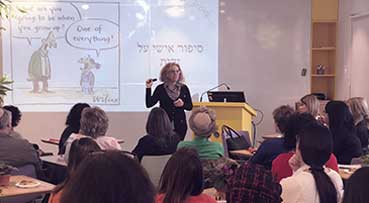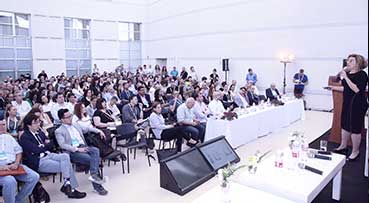For some people networking is as natural as breathing. Others are terrified by it.
For some, a network means contact, relationships, intimacy, the ability to enter a room and feel comfortable. For others, it is exactly the opposite: stress, pressure, duty, liability, obligation.
So what is a network?
We are told that networking is important. The broader and deeper our network is, the more likely it is to help us inside the organization and in our greater ecosystem. We are told that our network will help us succeed in our current role, it will open up opportunities for development and growth in our careers. Does yours? Do you know who your network is?
A Network is a system of relationships. It’s the system that turns us from individuals into groups and we all know groups have more power than individuals. A network is people, and in today’s world we almost can’t accomplish anything alone, almost everything requires some sort of collaboration. And collaboration is done with people.
There are several different types of connections in any network. Some are strong – these are the people you are surrounded by, at work, in you social circles, your family. Around them we have our weak ties – these are the people connected to us through others. These ties are particularly important, they are the people who have access to knowledge and possibilities we don’t. When searching for new jobs, for example, studies show that most opportunities show up through the weak ties, the friends of friends of friends. And in order to end up with these possibilities, we have to build our network to converse with these connections. In other words, we have to meet and talk with people we don’t know.
This, for some people, is not a simple thing to do. It helps to think about what you are really looking for. You are looking for common areas of interest. If those don’t exist, the links will have no place in your network. But if you do find them, they might turn into stronger links, the ones we communicate with more often, schedule regular catch up meetings, maybe even collaborate with or end up right up there within our social circle…
Why is networking so difficult for some of us?
Once, when work was a place you went to, and a friend was someone you actually knew, our network was the group of people from our different circles, usually people we actually knew. We belonged to various social circles, at work, our family and friends, our various schools and activities. All those links from the various circles were our “strong ties” and those are usually easier to create and maintain. Sometimes, if we lost touch with someone, they became a “dormant link”, one we could still feel comfortable “waking up” if and when it became necessary.
But our world has changed. Work is no longer a place you go but what you do. And friends, well, you have those in Facebook, LinkedIn, Twitter … Suddenly, our network consists of people we do not know and for many people defining these contacts as their network doesn’t seem right.
And yet we know our network is important for our career, that it needs to be maintained, so we can tap into it when we need it. For some of us, this feels forced, connecting with people without a solid reason. This feels a lot more like “Politics” and we all know how we feel about office politics…
If you want to test whether setting up a meeting is “networking” or “politics”, ask yourself how would you feel if someone asked you for a meeting under similar circumstances? Do you have common areas of interest? Is there a reason why you would want to learn from each other? Can one party can offer the other assistance or advice? If the answers are positive, it becomes a matter of deciding whether this connection is a priority for you. Otherwise, there is no point in holding the meeting just so you can say you’ve networked…
Where is the line between networking and misusing connections?
Some people are very careful not to network since connections translate for them into the problematic expectation they would need to do something for someone just because they are asked and can’t decline. You might be familiar with that phone call from the neighbor’s friend, who’s child just graduated and maybe you have a job for them… And if you’re thinking – didn’t we just say that your network was there so that people you don’t know will help you find a job, so why is that a problem? Well, the call itself is not the problem. Whether this is or isn’t an issue depends on how you manage expectations during that call. If the new graduate is a relevant candidate for an open position, you’ll be happy to get them connected with the hiring manager. But if they are not even close? Well, then there is no reason you’ll find them a job just because the call came through your network.
Our network is the foundation for collaboration between people based on common interests, common ground. It is the foundation, but within that we create our boundaries and need to know also how to manage the disappointments. The existence of the network does not mean that whatever anyone wants from you, you are bound to deliver. And it doesn’t mean that if someone is in our network, they will do anything we ask.
But it does mean that we can reach out, offer and receive assistance, advice, information, perspectives, opportunities. For this to work our network has to be comprised of win-win relationships, in which we are giving as well as receiving.
And how does all this relate to social networks?
Do not get confused, the focus of your network is people, not systems and tools. Networks and Social Networks are two very different things. Your network is the people you are connected to. What tools you choose to use to reach them, connect with them, converse with them, that’s a completely different conversation. But tools alone do not generate the two-way relationship and commitment you want in your network. Social networks are but one way to create a network or sustain it. But they are not the main thing here and certainly should not be confused with your network itself. The tools are the means. The essence is the connecton between people.
So what now?
Ask yourself, what are your goals in the next few years. Then check who, in your network, will be there to help you accomplish them. You might discover most of your connections are connected to the ecosystem you depended on in the past few years but might be lacking for where you need to go. One of the common issues is a great network within one’s organization, which might not be sufficient if and when you explore new options externally.
And no less important, check what is your role in other people’s networks. Remember win-win, you need to be there for them just as much as you want them to be there for you. For our network to be strong, it needs to serve all its parts. So ask yourself, what role can you take on for others, what do you have to offer?

![large-AX1A2125-2[1] large-AX1A2125-2[1]](https://niritcohen.com/wp-content/uploads/elementor/thumbs/large-AX1A2125-21-pnzedcs72atx5aeurqytqdiihxixlq02re9mlz805s.jpg)






